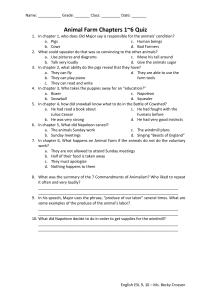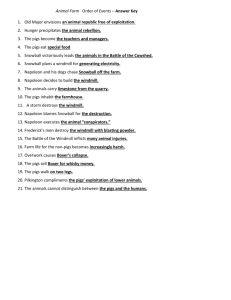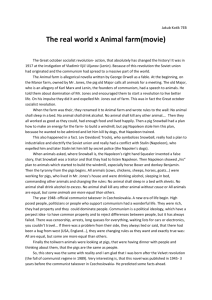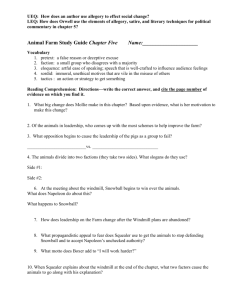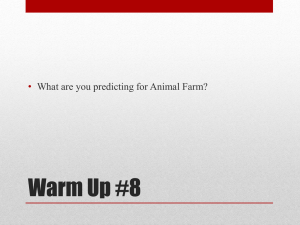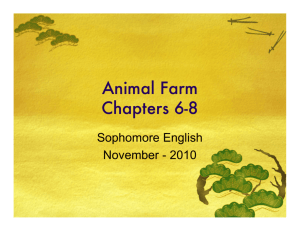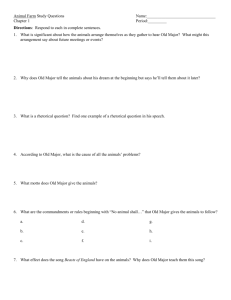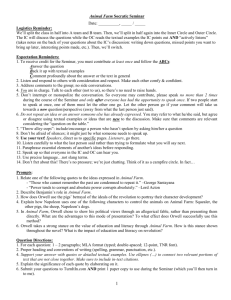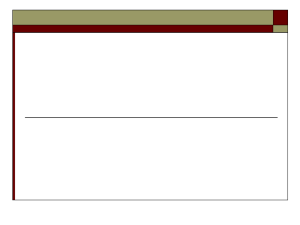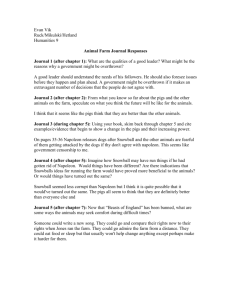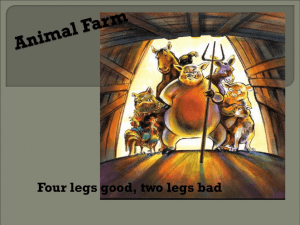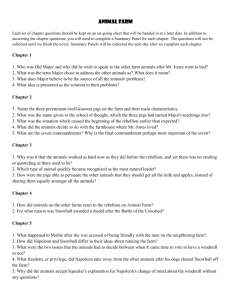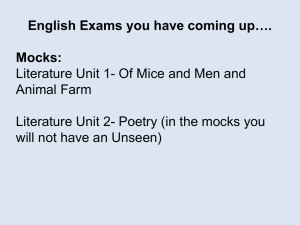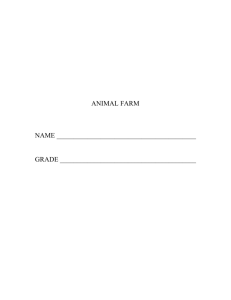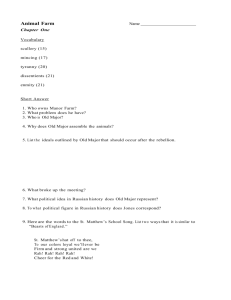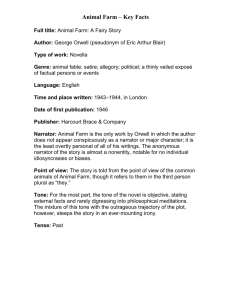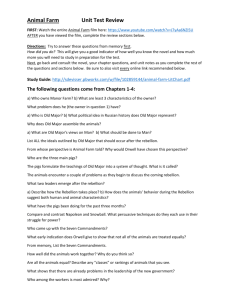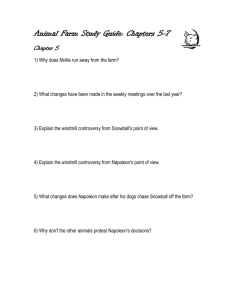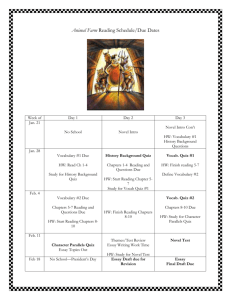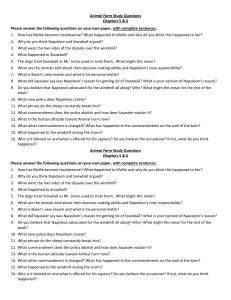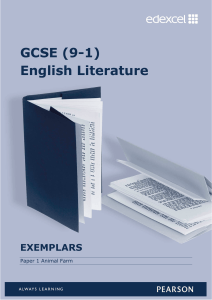Animal Farm - Marshall`s Pine GT
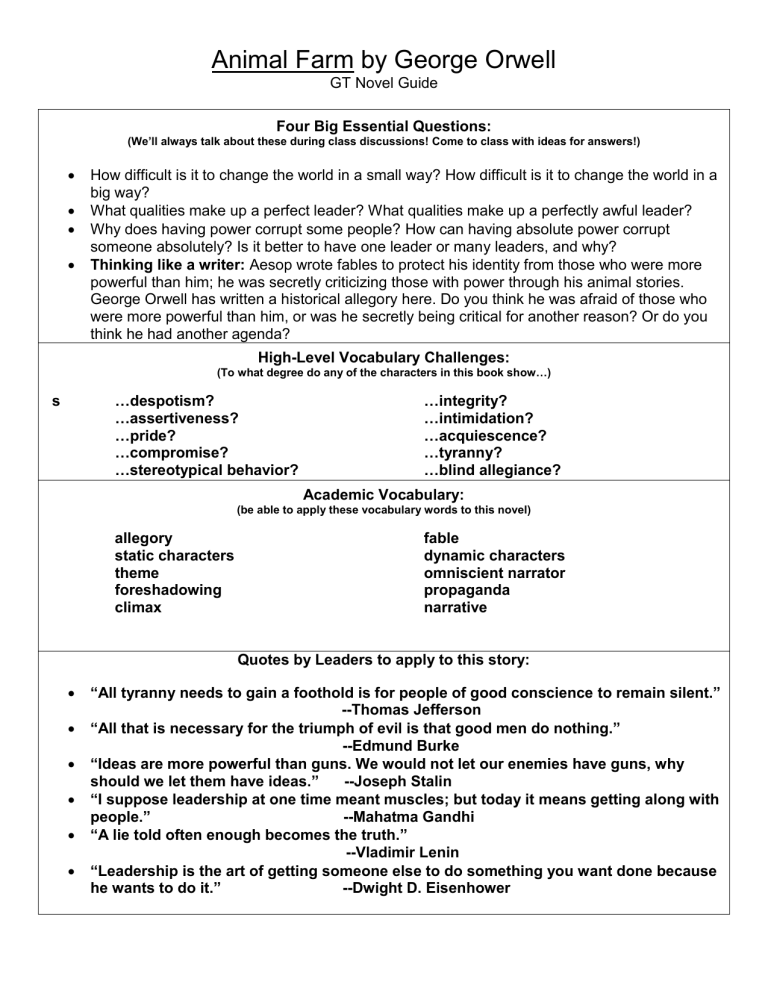
Animal Farm by George Orwell
GT Novel Guide
Four Big Essential Questions:
(We’ll always talk about these during class discussions! Come to class with ideas for answers!)
How difficult is it to change the world in a small way? How difficult is it to change the world in a big way?
What qualities make up a perfect leader? What qualities make up a perfectly awful leader?
Why does having power corrupt some people? How can having absolute power corrupt someone absolutely? Is it better to have one leader or many leaders, and why?
Thinking like a writer: Aesop wrote fables to protect his identity from those who were more powerful than him; he was secretly criticizing those with power through his animal stories.
George Orwell has written a historical allegory here. Do you think he was afraid of those who were more powerful than him, or was he secretly being critical for another reason? Or do you think he had another agenda?
High-Level Vocabulary Challenges:
(To what degree do any of the characters in this book sh ow…) s
…despotism?
…assertiveness?
…pride?
…compromise?
…stereotypical behavior?
…integrity?
…intimidation?
…acquiescence?
…tyranny?
…blind allegiance?
Academic Vocabulary:
(be able to apply these vocabulary words to this novel)
allegory
static characters
theme
fable
dynamic characters
omniscient narrator
climax narrative
Quotes by Leaders to apply to this story:
“All tyranny needs to gain a foothold is for people of good conscience to remain silent.”
--Thomas Jefferson
“All that is necessary for the triumph of evil is that good men do nothing.”
--Edmund Burke
“Ideas are more powerful than guns. We would not let our enemies have guns, why should we let them have ideas.
” --Joseph Stalin
“I suppose leadership at one time meant muscles; but today it means getting along with people.” --Mahatma Gandhi
“A lie told often enough becomes the truth.”
--Vladimir Lenin
“Leadership is the art of getting someone else to do something you want done because he wants to do it.
” --Dwight D. Eisenhower
Animal Farm
Chapter Discussion Questions
For class, be prepared to discuss the following questions on the assigned discussion days. Writing out answers ahead of time is optional for all students —at first; students who come unprepared to discuss these questions as a class will be required to write out answers for the remaining chapters of the book.
Chapter I
1. What message does Old Major pass along to his fellow farm animals? Does what he says seem to be the truth?
Why or why not?
2. What is significant about how the animals arrange themselves as they gather to hear Major? What might this arrangement foreshadow?
3. Immediately after Old Major tells everyone that a “perfect comradeship” will be required to overthrow the humans, a discussion erupts about whether to include rats. What do you make of this? What might it foreshadow?
4. How does this story remind you of Aesop’s Fables? Compare and contrast Aesop’s Fables with this story.
Chapter II
1. Why does the work of teaching and organizing the animals fall to the pigs?
2. Do you think the animals’ vision for their society is noble? Support your response using examples from this book.
3. Why isn’t anyone concerned that the milk might be wasted? What do you think this says about the animals’ decision-making skills?
4. Why don’t the pigs like the pet raven Moses’ stories about Sugarcandy Mountain?
Chapter III
1. What further examples of the difference between the pigs and the other animals occur in these two chapters?
2. “Four legs good, two legs bad.” Why was this maxim devised? How does it motivate the animals?
3. Compare/contrast Snowball and Napoleon. Whose actions do you feel are more honorable/helpful?
4. How is Squealer able to convince the other animals to accept whatever Napoleon decides?
Chapter IV
1. How does Orwell use irony in this chapter to show the difference between what the animals are fighting for and what they believe they are fighting for?
2. What do you believe to be Snowball’s motivation for declaring that all the animals need “to be ready to die for
Animal Farm?” Do you think this is necessary?
Chapter V
1. Who do you agree with more about how the animals use their time during the winter months? Should they be devoting their time to building the windmill as Snowball says, or should they be focusing on increasing food production like Napoleon says? Be prepared to explain your reasoning.
2. Why and how does Napoleon seize power for himself and banishes Snowball?
3. Why don’t the animals protest Napoleon’s decisions?
4. What is the importance of the dogs accompanying Squealer when he comes to talk to the animals?
Chapter VI
1. Despite everyone working hard to build the windmill, why are the rations being cut? Is this fair? Are the leaders being honest with the animals? How do you know?
2. What does the windmill come to symbolize in this story?
3. What are we meant to understand about power when the pigs begin sleeping in the farm house beds?
4. Which vocabulary words from the list are represented in this chapter? Be prepared to explain.
Chapter VII
1. How do the animals deny the truth of the humans’ explanation of the reason why the windmill was destroyed during the storm, yet use their idea of rebuilding the windmill with thicker walls?
2. When the hens were rebelling against having their eggs sold and consequently received no rations until they moved back to their nesting boxes, why do you think none of the other animals seemed to respond in any way? If you were one of the animals, what would you have done?
3. If you could choose to become one of the animals represented in Ch. VII, which one would you be and why? How does this animal most represent who you are or would like to be?
4. Make observations about the incident where animals who confessed their “crimes” were slain.
5. How do the pigs produce a false vision of reality? Do you believe this will be productive?
Chapter VIII
1. How do the animals react when they see the newly rewritten rule “No animals shall kill any other animal without cause?” Who is changing the rules and why is this allowed?
2. Which vocabulary word/s from the list are most represented in this chapter? Be prepared to explain using evidence from the text.
3. What is the purpose of the poem on page 94? Does this poem praise or mock Napoleon? Why is this an important distinction?
Chapter IX
1. Why are the characters becoming weaker and weaker, and yet, they continue to follow their chosen leader?
Rations aren’t evenly distributed and promises aren’t kept. Why do they continue along this path without an uprising?
2. Do you think it is fair that Napoleon is elected president without any opposition? Why didn’t anyone run against him?
3. What kind of person does Squealer remind you of in Chapter IX? How is he important to the progression of the story?
4. How does fear continue to immobilize the animals from making any real change in their lives (or leadership)?
Chapter X
1. What word would you use to describe the tone George Orwell is presenting in the beginning of Chapter X as he describes the farm after a number of years?
2. “All animals are equal, but some animals are more equal than others.” What do you think this means—is it fair?
3. Was The Rebellion worth it?
4. What was the author’s purpose in writing this story?
5. Did you like this book? Why or why not?
Post Reading
1. If the pigs represent people, what does this book say about human nature? Are people inherently good or bad?
Why?
2. If “Animal Farm” represents human society, what is the responsibility of the people to those who govern them?
3. Assuming people go into powerful positions like politics to change things for the better, why is it that sometimes they end up breaking their original promises?
4. If “Animal Farm” represents a dictatorship, compare/contrast that to our democracy here in the United States.
How does our form of government keep the President from moving beyond the authority and consent of the people?
5. Was the outcome of Animal Farm inevitable or could it have ended differently? Under what circumstances?
